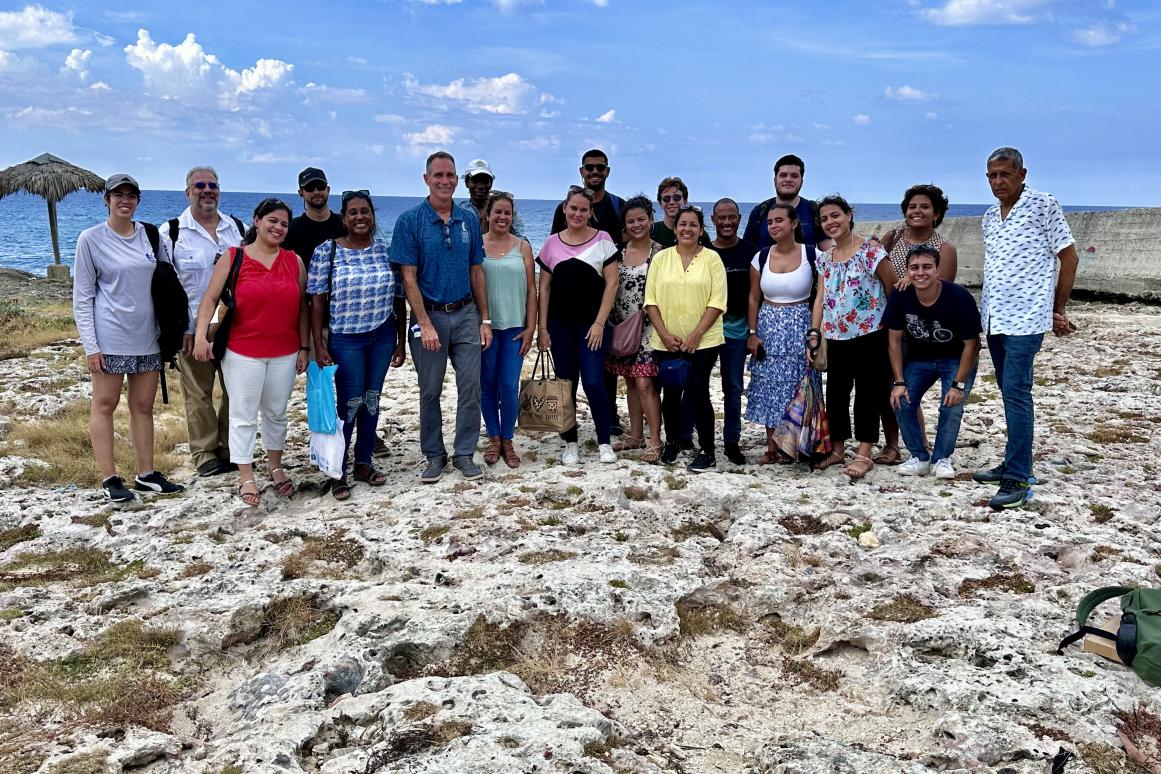Return to Cuba: HRI Contingent Among Speakers as MarCuba Congress Returns

The MarCuba Congress provides a unique platform for scientists and researchers from around the Gulf of Mexico to converge in Cuba and foster meaningful relationships and share innovative scientific ideas.
The congress, held in Havana, Cuba from October 1-4 this year, serves as a collaborative hub, encouraging the exchange of knowledge and formation of partnerships that drive forward marine science research and solutions. This year marked the congress’ 12th edition and the first time it has been held since 2018 with the theme “Cuban science for the resilience of coastal-marine ecosystems” and around 300 people attended.
Eight researchers from the Harte Research Institute for Gulf of Mexico Studies at Texas A&M University-Corpus Christi (HRI) attended the conference this year, covering multiple topics ranging from fisheries to coral reefs to microplastics. It also continued the work of fostering international research partnerships in the Gulf of Mexico as HRI has been working with Cuban partners for more than 20 years to help broaden marine and coastal research.
The congress is typically conducted every three years but there was not a conference in 2021 due to the COVID pandemic.
“The return of MarCuba continues a commitment by scientists in the United States, Mexico and Cuba to work together to help build a sustainable future for the Gulf of Mexico,” said Dr. Mark Besonen, HRI’s Director of International Programs and a keynote speaker at this year’s event. “By continuing to work together across coastlines, we can address the shared challenges facing our marine ecosystems and promote long-term conservation and sustainability.”
HRI’s Furgason Fellowship International Chair for Coastal and Marine Studies in Cuba, Dr. Patricia Gonzalez Diaz, served as the chair for the scientific committee for the congress, and gave a keynote speech titled “Cruise around Cuba: A necessary challenge for marine sciences and Cuban society.” She also hosted a book presentation for the 438-page “Coral Reefs of Cuba” volume recently published by Springer. Diaz served as the author or co-author on seven of the 23 chapters.
Besonen was among two HRI speakers to give multiple presentations at the event. One focused on the Institute’s Student Workshop on International Coastal and Marine Management program and the other a keynote talk on “Our Gulf: Working Together for a Better Tomorrow.”
HRI’s Director of Community Engagement Jace Tunnell provided a two-hour microplastics workshop, along with a presentation on his Nurdle Patrol program. Tunnell’s father, Dr. Wes Tunnell, a former HRI chair and co-founder, had a long relationship with the Cuban marine science community through his work at the institute.
Presentations from HRI scientists and researchers were wide ranging at this year’s event. James Sanchez, the Angler Engagement Coordinator for the Center for Sportfish Science and Conservation (CSSC), spoke on “Science that Keeps you Hooked”, which empowers anglers to become wise stewards of resources. Tara Topping, a research specialist with CSSC, discussed how cooperative tagging programs and self-reporting bolster citizen science opportunities for recreational anglers.
Dr. Jennifer Pollack, the Larry D. McKinney Endowed Chair for Costal Conservation and Restoration, spoke on using research and restoration to inform oyster resource management and policy decisions.
Dr. Keisha Bahr, Chair for Coral Reef and Ocean Health, explored coral health through her study on linking coral color with environmental changes.
Terry Palmer, a senior research scientist with the Coastal Conservation and Restoration program, highlighted the importance of serpulid reefs in a hypersaline estuary.
The 12th edition of the MarCuba Congress not only showcased groundbreaking research but also strengthened international collaborations, reinforcing the shared goal of preserving the Gulf of Mexico’s marine ecosystems for future generations. By uniting efforts with scientists, conservationists, and policymakers form neighboring countries, HRI continues to advance critical research and conservation initiatives aimed at ensuring the long-term health and sustainability of this vital marine region.
